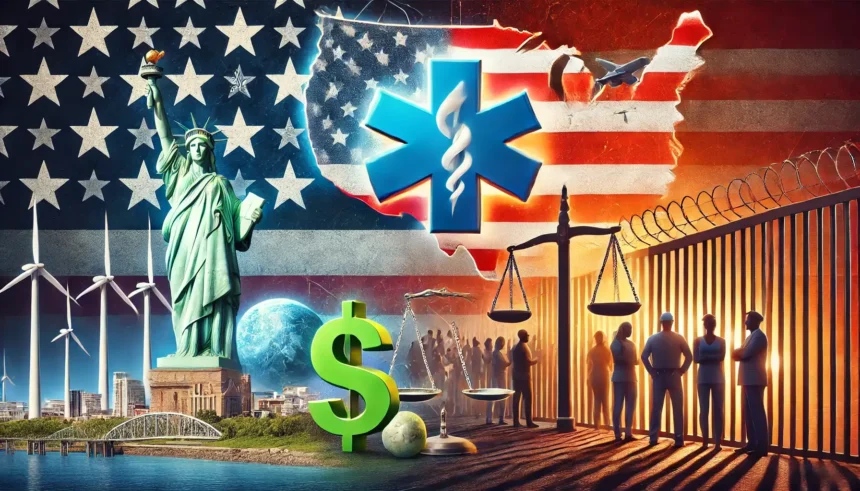Politics is more than just a buzzword on the news or debates we see during election cycles—it’s about the real, everyday lives of people across the country. From healthcare and climate change to social justice and immigration, these political issues aren’t abstract ideas—they’re about families, communities, and our shared future.
Let’s explore the most pressing political issues that affect millions of Americans today and why these concerns matter to each of us.
1. Healthcare Reform: A Personal and National Struggle
Healthcare touches every single one of us in deeply personal ways. Whether it’s making sure you can afford a routine check-up or dealing with a sudden illness, access to affordable and reliable healthcare is critical. But the U.S. healthcare system often leaves millions of people feeling anxious about the next medical bill.
Think about the person who has to decide whether to pay for their medicine or rent. It’s heartbreaking. That’s why the healthcare debate—whether it’s expanding Medicare for All, reforming the Affordable Care Act (ACA), or tackling the high cost of prescription drugs—resonates so deeply.
For advocates of Medicare for All, the vision is simple: healthcare should be a right, not a privilege. It promises universal coverage for all Americans, eliminating the anxiety of high premiums and medical bankruptcy. But with any big idea comes challenges—how will it be paid for? And will people lose the flexibility to choose their healthcare providers?
The Affordable Care Act—a significant milestone in expanding healthcare—has helped millions gain coverage. But for many, it’s still far from perfect. Prescription drug prices are rising, coverage can be limited, and many Americans still find navigating healthcare systems overwhelming. The fight for reform is far from over.
The Human Impact: We’ve all met or heard about people struggling to afford healthcare—whether it’s a senior choosing between groceries and medication, or a young adult losing coverage after turning 26. Healthcare isn’t just political—it’s personal, and that’s why it matters.
2. Climate Change: Protecting the Planet for Future Generations
If you’ve ever experienced an unusually intense heatwave, watched the news about wildfires, or seen flooding in your community, you know that climate change is no longer something happening far away. It’s real, it’s happening now, and it’s affecting everyone—from families in coastal towns to farmers across the Midwest.
The urgency of climate change is felt across the board. People care about leaving a healthier planet for their children, and it’s clear that action is needed. For many voters, this isn’t just a political debate—it’s about survival.
The debate centers on how to reduce carbon emissions and transition to renewable energy. Renewable energy—like solar and wind power—is gaining traction. The shift from fossil fuels to cleaner alternatives isn’t just about saving the planet; it’s also about creating jobs and driving innovation.
Some proposals, like the Green New Deal, aim to address climate change aggressively while simultaneously reducing economic inequality. However, not everyone agrees on how fast or what methods should be used to reach these goals.
The Human Impact: Think about the families displaced by hurricanes or the communities grappling with the aftermath of wildfires. Climate change isn’t some far-off problem—it’s here, and it’s shaping our lives. The fight for climate action is about protecting our homes, our jobs, and the planet itself.
3. Social Justice Movements: Equality for All Americans
The U.S. has always wrestled with issues of inequality, but in recent years, the calls for justice have reached new heights. Movements like Black Lives Matter and #MeToo are not just about protesting—they’re about creating lasting change and making sure that all people, regardless of race, gender, or background, have a fair shot at life.
The death of unarmed Black Americans at the hands of law enforcement sparked waves of protests and brought police reform and racial inequality into the national spotlight. People are demanding justice, not only through words but through action. Police reform, ending systemic racism, and creating a fairer criminal justice system are at the heart of this movement.
For the LGBTQ+ community, the fight is about securing full equality and legal protections. Yes, same-sex marriage is now legal, but there are still battles to be won—whether it’s ensuring healthcare access for transgender individuals or fighting discrimination in schools and workplaces.
Gender equality remains a central issue as well. Thanks to the #MeToo movement, sexual harassment and gender-based discrimination have been exposed in ways that can no longer be ignored. People are calling for stronger protections in the workplace, equal pay for equal work, and reproductive rights.
The Human Impact: Whether it’s a young Black man worried about being stopped by police or a woman afraid to report workplace harassment, social justice is about real people with real struggles. The fight for equality is about making sure everyone can live with dignity and respect.
4. Immigration Reform: Finding the Balance Between Security and Compassion
Immigration has long been a defining issue in American politics, but it’s also one that’s deeply personal for millions of families. Whether you’re a recent immigrant or your family has been here for generations, the debate about how to handle immigration is central to the American identity.
People on all sides of the issue are asking important questions: How do we protect our borders while still offering a path to a better life for those fleeing violence and poverty? What’s the right balance between security and compassion?
Border security remains a hot-button topic, with calls for stronger enforcement to prevent illegal immigration. But at the same time, many Americans recognize the need for more humane immigration policies, particularly for asylum seekers and those brought to the U.S. as children, often referred to as Dreamers.
The fate of DACA (Deferred Action for Childhood Arrivals), a program that protects Dreamers from deportation, is a crucial part of the debate. These young immigrants, who have grown up as Americans, are fighting for the right to stay in the only country they’ve ever known.
The Human Impact: Think about the families who fear separation, or the Dreamers who live in constant uncertainty about their future. Immigration isn’t just a political talking point—it’s about people’s lives and their hopes for a better future.
5. The Economy: Balancing Growth with Fairness
No matter who you are or where you live, the economy impacts your life. Whether it’s worrying about paying rent, saving for the future, or finding a stable job, economic issues are always top of mind for American voters. And in recent years, concerns about rising inflation, stagnant wages, and job insecurity have become more urgent.
Inflation has made it harder for people to afford everyday essentials—from groceries to housing. Wages aren’t keeping up with the cost of living, leaving many Americans feeling like they’re falling behind.
The push for a $15 minimum wage is one solution being proposed to help families make ends meet. Supporters argue it would lift millions out of poverty, but opponents worry about the potential impact on small businesses and job creation.
Meanwhile, job growth is a critical issue as more industries evolve due to automation and technology. Politicians are grappling with how to create new jobs and support workers in industries that are being disrupted.
The Human Impact: Economic struggles don’t just show up in the numbers—they’re part of everyday life for millions of Americans. Whether it’s a parent struggling to make ends meet or a young person entering a tough job market, the economy is about more than GDP—it’s about people’s well-being.
Conclusion
Politics isn’t just about policies or party lines—it’s about the issues that affect all of us in our daily lives. Whether it’s worrying about healthcare, fighting for justice, or hoping for a better economic future, these key political issues define the national conversation.
By understanding and engaging with these topics, we can all play a part in shaping the future of the United States. The solutions won’t be easy, but by focusing on the human side of these political debates, we can work toward a future that’s fairer, more just, and more hopeful for everyone.







